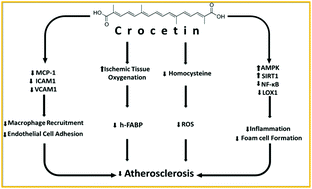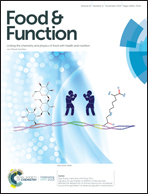The effect of crocetin supplementation on markers of atherogenic risk in patients with coronary artery disease: a pilot, randomized, double-blind, placebo-controlled clinical trial
Abstract
Background and purpose: Molecular mechanisms of atherogenesis are considered to be emerging therapeutic targets for atherosclerosis prevention. Cell and animal studies have shown that crocetin can decelerate atherogenesis. However, the anti-atherogenic properties of crocetin in humans are still ambiguous. Methods and results: Fifty clinically diagnosed CAD patients were randomly divided into two parallel groups, crocetin and placebo, who received one capsule of crocetin (10 mg) and placebo per day, respectively, for two months. Serum circulating homocysteine (Hcy) [−1.09 (−1.64 to −0.54) μM, P = 0.001], heart-type fatty acid binding protein (h-FABP) [−2.07 (−2.72 to −1.43) ng mL−1, P = 0.001], intercellular adhesion molecule 1 [−14.92 (−21.92 to −7.92) ng mL−1, P = 0.001], vascular cell adhesion molecule 1 [−18.61 (−29.73 to −7.49) ng mL−1, P = 0.002], and monocyte chemoattractant protein 1 [−4.67 (−6.50 to −2.83) pg mL−1, P = 0.001] decreased significantly after the trial in the crocetin group, while high-density lipoprotein (HDL) significantly increased [+4.21 (0.68 to 7.73) mg mL−1, P = 0.021]. Also, systolic [−0.21 (−0.32 to −0.10) mmHg, P = 0.001] and diastolic [−0.20 (−0.34 to −0.07) mmHg, P = 0.004] blood pressures decreased significantly in the crocetin group. Nevertheless, clinically significant percentage changes were only observed in Hcy (−15.25 ± 3.15, μM), HDL (−10.70 ± 5.06, mg dL−1), and h-FABP (−21.10 ± 3.09, ng mL−1) in the crocetin group. Furthermore, the relative increase in the gene expressions of sirtuin1 and AMP-activated protein kinase and a decrease in the lectin-type oxidized LDL receptor 1 and nuclear factor-kappa B expression in isolated peripheral blood mononuclear cells in the crocetin group were significant at the end of the trial in comparison with the placebo. Conclusion: As the first human study, we showed the ability of crocetin to alter the expression of atherogenic genes and endothelial cell adhesion molecules in CAD patients. It appears that crocetin could be considered as a promising anti-atherogenic candidate for future studies.



 Please wait while we load your content...
Please wait while we load your content...